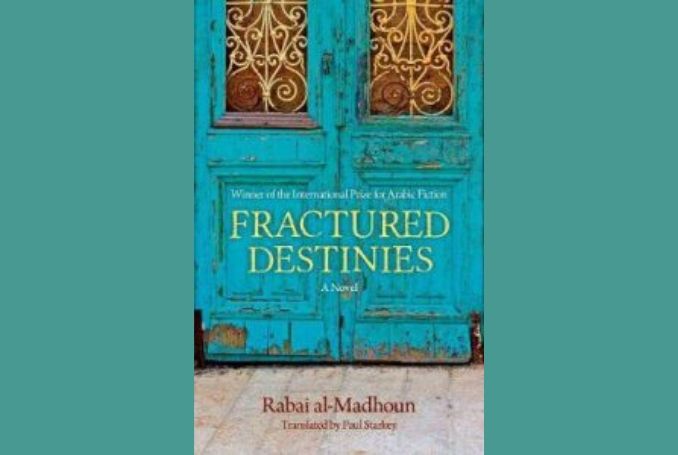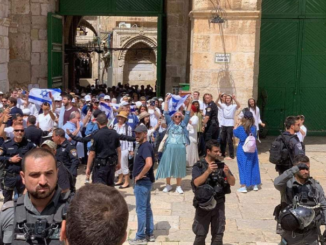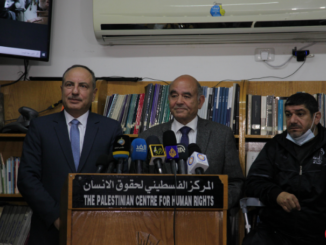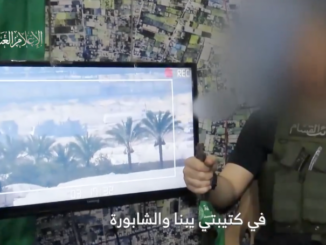
(Fractured Destinies, by Rabai al-Madhoun, translated by Paul Starkey, 257 pp. Hoopoe $18.95)
The word “concerto” takes its derivation from the Latin concerto, -are, -atus (“to contend”), though contemporary usage modulates the word to mean “agreement.” Rabai al-Madhoun’s novel Fractured Destines, written in mimc of the concerto structure, prefers the former.
The novel takes as its key motif Julie Dahman’s crusade to repatriate her mother Ivana Littlehouse’s ashes to Old Acre or Jerusalem, if the former is “too difficult a matter for some reason.” (22) When Julie sets off with the glass figure containing Ivana’s ashes, designed to Ivana’s exact specifications, the novel expands in scope to investigate the roles of history, memory, nostalgia, exile, and death. Alongside Julie is her husband, Walid Dahman, a novelist whose family left al-Majdal Asqalan during the 1948 Nakba for Khan Younis camp in Gaza. Walid later moved to Britain and became “British”—any demonym (a noun indicating origin; e.g. “Palestinian”) of al-Mahoud’s characters must be understood as an adjective with alterable definition.
Julie, the only one of the four central characters to have been raised abroad, is enchanted by the Levant, so much so that a moment of unusual religious fervor causes her face to glow “like a flower whose petals had been opened by the first rays of the sun.” (31) There is a balancing act between Julie and “The Remainer,” the protagonist of Jinin’s (Walid’s relative) work, and modeled after Jinin’s father, Mahmoud Dahman, who resolved not to leave Palestine in 1948.
It is not long until Julie voices her desire to relocate to Palestine with Walid, who himself “walked like someone walking between two ages, holding on to neither of them” (218) when back in Palestine, The assumed ease with which this social and political wish could be fulfilled for Julie is a luxury unavailable for almost every other character, al-Madhoun and Jinin’s alike.
The second movement develops the relationship between Jinin, an Israeli citizen, and her husband Basim, who is from the West Bank, holds an American passport, and is thwarted each time he attempts to gain a work visa in Jaffa. Jinin’s career holds great import for the structure of Fractured Destinies: while writing “Filistani Tays,” she sends an incomplete draft to her relative Walid. As he reads the manuscript, so does al-Madhoun’s reader; long passages of Jinin’s work are spliced into Fractured Destinies. As “The Remainer” becomes more salient, so do the tensions with Jinin and Basim’s marriage; “The Remainer” plans a silent, public protest, foreshadowing the conclusion of al-Madhoun’s open ending.
The political freight transferred by any character’s tongue cannot be neglected. Historical exposition courses through the narrative with conspicuous modulations of tone, voice, and perspective; Walid often acts as a stand-in for historical consciousness, but in a novel where identity and political disposition is so central, we cannot take Walid at his word without becoming complicit in his Weltanschauung.
Counterpointing the fictional and historical, Fractured Destinies undermines a traditional formulation of character; even the four main serve to demonstrate a historical reality, often at the expense of their (if thinking traditionally) fictional personality.
Apropos to a novel containing a novelist’s draft, Paul Starkey’s translation draws regrettable attention to itself, a quality done no favors by the melodramatic tone in which al-Madhoun’s narrator often speaks. For instance, Julie’s mother would “be there with her forever,” (26) and that “the time had come to go back to her [Julie’s] roots.” (37) At one point, when the labyrinth of Israeli bureaucracy is at its most dense, Basim feels he is “an invitation to punish the self,” (91) and compensates by rolling “himself up in an envelope of despair and sleeping.” (101)
The reader may be perplexed by the disjoint between the interrupted determinism hinted at by the title and the open, renewing tone of the novel’s conclusion. In the final scene, Walid and Julie are in Ben Gurion Airport, in Lydda preparing to depart to London. She alludes to Walid the question put to him in at the novel’s beginning: “What do you think about selling our house in London and coming to live in Acre?” (37) Walid’s reply that they will “talk about it when we get home” (257) should indeed sound suspicious to any reader even faintly attuned to al-Madhoun’s subliminal thesis that loyalty to origin and the struggle to define oneself by the context of their history result in paradoxical, almost oxymoronic conclusions. Some may elect to name this way of being resilient.
Does Fractured Destinies give a snapshot of contemporary Palestine? Without question. Ultimately, the primary crisis which drives the plot, the repatriation of Ivana’s remains functions as a way for al-Madhoun to deploy a milieu of personalities we often meet only once. Each persona encountered shades and sculpts our understanding of the conditions of the contemporary Levant and its inhabitants. Frustration, joy, persistence, and dejection are all heard contending to be the most dominant mood. But resolution is always just beyond earshot. Fractured Destinies offers no solutions, a facet which should be counted among the novel’s strengths.
– Marshall McGraw is based in the United States and holds a B.A. in Literature from Bennington College. He contributed this article to The Palestine Chronicle







